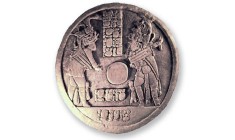Culture Without Context 20
Culture Without Context (2007), Issue 20 (Cambridge: McDonald Institute for Archaeological Research).
Contents:
Editorial – Neil Brodie
Artefacts in the closet: displaying cultural objects that are victims of illicit trafficking – Pontus Forslund
Archaeologists, collectors, museums and John Boardman – Neil Brodie
In the News – Jenny Doole
Book reviews:
The Medici Conspiracy by Peter Watson and Cecilia Todeschini – Vinnie Nørskov
Art and Archaeology of Afghanistan edited by Juliette van Krieken-Pieters – Neil Brodie
Editorial
by Neil Brodie
I have been asked several times recently about the genesis o f the government’s Illicit Trade Advisory Panel, whose report in December 2000 is generally considered responsible for the United Kingdom’s accession to the 1970 UNESCO Convention. For once, it is a question I can answer with some degree of authority. In April 2000, the IARC was working with Maurice Davies of the Museums Association towards a final draft of Stealing History, a report commissioned by the Museums Association and ICOM-UK to recommend guide lines for museums policy towards the trade in cultural and natural materials. At a reception, Maurice met Made lei ne Holt, who was at the time arts correspondent on the BBC2 television current affairs programme Newsnight. Madeleine was interested in cove ring our work on Newsnight, and the three of us met to discuss a possible piece. It was screened on 12 April. First there was a short documentary report on the illicit trade, including interviews with Maurice and myself, and highlighting what were likely to be the recommendations of Stealing History. Then there was a debate chaired by Jeremy Paxman, with Colin Renfrew in the studio and the then Minister for Arts Alan Howarth on a live television link. After a few minutes discussion, Alan Howarth announced his intention to set up an expert advisory panel to consider the problems involved and invited Colin Renfrew to be a member. Colin Renfrew accepted and ITAP was born. It was formally convened on 24 May 2000 under the chairmanship of Norman Palmer.
The saga of the Schoyen incantation bowls continues. I reported in the last issue that in 2004 University College London (UCL) convened a committee of enquiry to investigate the provenance of 654 Aramaic incantation bowls belonging to Martin Schoyen that had been deposited at UCL for study. The committee submitted its report in 2006. The original UCL 2 announcement stated UCL’s intention to publish the report’s conclusions, but this has not happened. Furthermore, UCL has recently informed several people (myself included) that the report is a confidential document and that UCL is not able to enter into discussions about its subject matter. No explanation has been offered as to why UCL appears to have changed its mind over publication.
On 9 March 2007 the Schoyen Coll ction announced that it was to commence legal proceedings against UCL for the return of the bowls. These legal proceedings have now concluded. On 26 June 2007 the Schoyen Collection and UCL issued a joint press release announcing that ‘UCL has no basis for concluding that title is vested other than in the Schoyen Collection’, and that UCL has now returned the bowls and ‘ agreed to pay a sum in respect of its possession of them’. Presumably payment was part of the settlement, although it is not specifically stated. Perhaps non-publication of the report was another part? It seems strange though. If there is nothing in the report to incriminate Martin Schoyen, and presumably there isn’t or UCL would not have returned the bowls, there should be no problem with its publication.
It is also strange that UCL ha s agreed to ‘pay a sum’ to Schoyen in respect of possession when Schoyen himself had deposited them at UCL fo r study. Schoyen stands to make quite a profit from academic collaboration. Incantation bowls with translated texts are offered for sale with prices anything up to ten-times those asked for bowls without translations. The study and translation of Schoyen’s bowls at UCL will have increased their monetary value quite substantially. And then UCL pa id more on top. Nice business.
This is the last issue of Culture Without Context. After 10 successful years, the McDonald Institute has decided that it will not support the Illicit Antiquities Research Centre past 30 September 2007, and so the Centre will close on that date.
